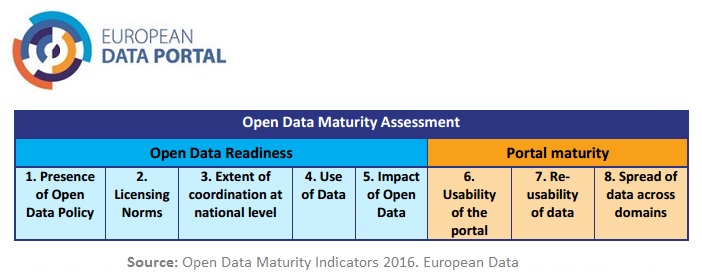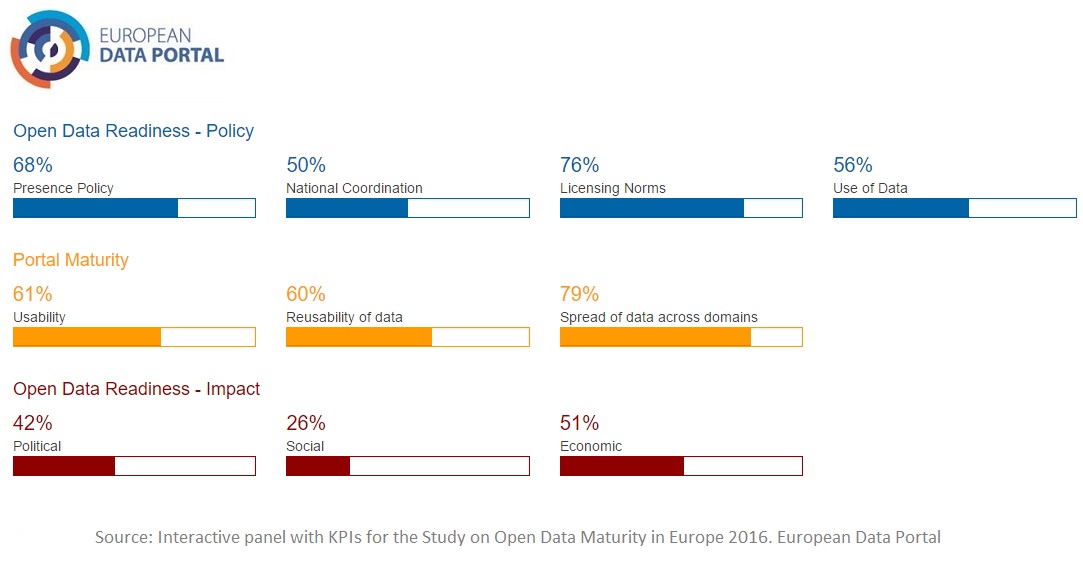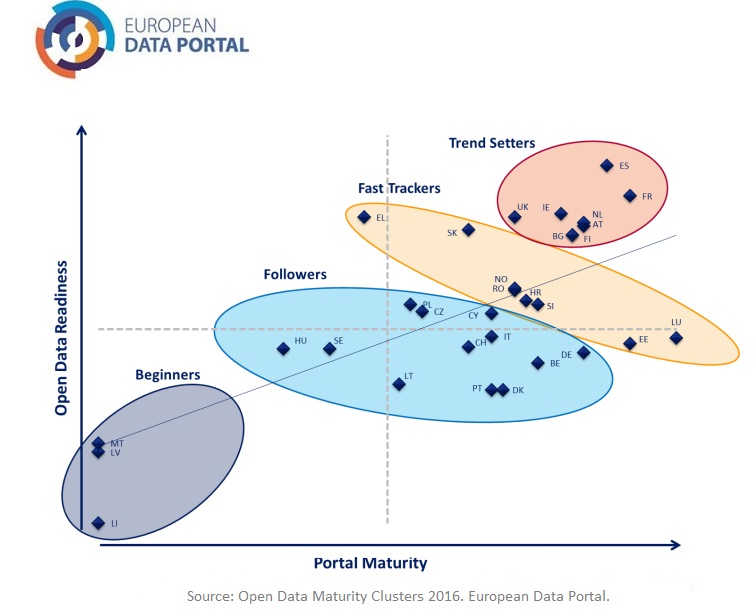For the fourth consecutive year, the European Data Portal has published the European Open Data Maturity Landscaping 2018. This study gathers the current situation and the progress made by the different European countries in terms of open data.
Experts have identified a number of countries with high performance and a clear strategic focus on open data, such as Spain, that ranks second for the second year in a row. These countries’ priorities demonstrate their deep understanding of open data as a strategic asset to drive digital transformation.
General conclusions
The general results show some heterogeneity both in the speed of transformation, and in the priorities of the European countries analyzed. In addition, the leadership of a few European countries, such as Spain, is highlighted as developers of strategic measures to exploit the value of open data.
This year the report introduces higher granularity to evaluate more rigorously the maturity of open data at country level. To do this, it adds two new study dimensions (impact and quality) to the indicators included in the previous editions (policy and portal). By focusing on these four perspectives, the 2018 report allows a more detailed understanding of each country effort and performance over the past year.
The following figure shows the average scores obtained by the set of European countries in each dimension, which are explained below:

- Policy. This dimension focuses on the presence of specific policies on Open Data at national level, on the existing licencing norms, and the extent of national coordination. According to the study, European countries (EU28) achieve a score of 82% in this dimension. It should be noted that all EU28 countries, except Sweden, have a specific open data policy.
- Portal. This dimension analyses the maturity of the national Open Data portals, including considerations around their functionality, usage, variety of data featured, and the approach to ensuring the portal’s sustainability. In Europe (EU28), the average maturity in this dimension is 63%. One third of European countries get an advanced level of maturity, while the remaining two thirds have a lot more room for improvement.
- Quality. This dimension explores the extent to which national portals have a systematic and automated approach to harvesting, the accuracy and reliability of available data, and the compliance level in terms of the metadata standard DCAT-AP. In the analyzed territory, the level of quality maturity is 62%. Only 7 countries exceed 75%.
- Impact. This dimension analyses the existing approaches and methodology developed at country level to monitor and measure Open Data reuse and impact, as well as the impact of Open Data at country level on four dimensions: political, social, environmental and economic. In this dimension, there's still much more room for improvement, since it currently stands at 50% on average.
The role of Spain
Spain is above the European average in the four indicators analyzed, with 93% in policy, 97% in impact, 78% in portal and 78% in quality. In total, our score is 87%, less than one point below Ireland, which occupies the first position.
The report groups the analyzed countries around 4 maturity groups: beginners, Followers, Fast-trackers and Trend-setter.

Spain is in Trend-setters group. This group is the one that suffer most changes, compared to the previous year: in 2017 there were 15 Trend-setters countries, but only 5 remain in 2018, including Spain.
This group include those countries that have an advanced open data policy in place with a strong coordination throughout the country. According to the report, the national platforms of this type of countries provide a wide range of functionalities to meet the needs of publishers and advanced users. In addition, there are initiatives to promote the publication of high quality data and the compliance with DCAT-AP.
With respect to reuse, in these countries, there are open data ecosystems with a high level of interaction focused on the reuse around data domains. In addition, activities to measure reuse are conducted.
Recommendations
The report ends with a series of recommendations for the different groups of countries that can be used as a "check-list" for the next 12 months. Do not forget that the report also can be used as a benchmark. The countries in the most incipient stages should take the trend-setters as reference to continue advancing at their maturity level.
In the case of trend-setters, such as Spain, the report includes the following recommendations, among others (you can read the complete recommendations here):
- Link to a variety of sources of real-time data and evaluate means of incentivising custodians of real-time data to enable publishing.
- Develop activities to enable data-driven policy-making in their organisation and commission research to showcase the value of reusing open data by the public sector itself.
- Work with training institutions on providing advanced open data courses and training to involve more advanced elements.
In short, the report shows how open data can be used as a strategic asset to transform the world we live. In Spain, we are going in a good direction, but we must continue working to continue in a leading position in Europe.
Open data indexes and Barometers are intended to reflect the international ranking of countries in their implementation of open data policies. Although it is practically impossible to measure exactly the level of openness, there are certain initiatives that give an overview of the interest in open data in the different countries of the world. In recent months, some of these indexes have been published, which, although they value different aspects related to open data, have the same purpose. How many global indexes are currently being produced in the world on open data? Do they reflect different realities? What methodology do they employ? What countries are analyzed? In this article we provide a description of the four most important indexes and some of their peculiarities.
Open Data Barometer (ODB) – World Wide Web Foundation
On June 1 the latest Open Data Barometer, prepared annually by the World Wide Web Foundation since 2013, was published. The Open Data Barometer assesses the policies and practices of open data that are being developed by 115 countries worldwide. Specifically, the Web Foundation measures how Governments make their data available to their citizens based on three main sources of information: evaluation questionnaires completed by experts, government self-assessments and other data from international databases.
The ODB analyzes three blocks of indicators aimed at measuring the progress of open data initiatives, implementation of open data programs and impact of open data in business, politics and civil society. It also analyzes the existence and quality of 15 sets of key data at national level (from government budgets, the census, public spending and public transport timetables, to crime statistics, environment or public contracts ...), the data refresh rate, accessibility, possibility of reuse, whether free of charge, type of license, interoperability, and so on. In short, more than 150 researchers and government representatives who make possible the production of a report which includes a set of conclusions on the general state of the open data sector in the world.
Informe anual European Data Portal
On March 4 - World Open Data Day - the European Public Data Portal released its annual report in which it analyzes the level of maturity of the open data ecosystem in Europe. In the second edition of the report, the portal evaluates 31 countries (the 28 members of the European Union plus Norway, Switzerland and Liechtenstein). According to this report, the state of open data across Europe has improved overall but it also highlights significant discrepancies between countries, as well as political, legal and technical barriers.
In order to identify the level of a country's maturity two blocks of indicators are set, aimed at measuring the maturity of open data throughout Europe: the availability of open data and the maturity of data portals. The first assesses a variety of aspects of open data policies in each state and to what extent each country carries out actions to measure the social and economic impact of data reuse. The second analyzes the level of maturity of the open data portals, measures the usability of the platforms, as well as the ease of data reuse and data access.
Global Open Data Index (GODI) – Open Knowledge Foundation
The Global Open Data Index, better known as GODI, is produced by the Open Knowledge Foundation. On 15 June, OKF published its global index of open data for 2017 which analyzes 94 countries and territories in the world. Through this index ten categories of data are analyzed. To measure the openness of these ten data types, Open Data Index bases its rating on responses to a questionnaire that includes questions about the format, openness, update rate or periodicity of publication of the data. The scores for each of these are added to create a final ranking where the level of openness of each national dataset is also displayed. This collaborative initiative is open to any citizen who wants to become a country analyst.
Índice OURData Index – OCDE
The OURData Index (Open, Useful, Government Re-usable Data) analyzes the situation of open data in 28 countries belonging to the OECD (Organization for Economic Co-operation and Development). The OECD OURData Index evaluates the efforts made by governments to implement open data in three critical areas: openness, usability and reuse of government data. The index data comes from member countries and focuses on government efforts to ensure the availability and accessibility of public sector data and to encourage greater reuse. The index is based on OECD methodology and the guidelines of the G8 OGD (Open Goverment Data) Charter. The OECD OGD analysis includes: business information, records, patent and trademark information, public bidding databases, geographic information, legal information, weather information, social data and transport information.
Experts point out that such studies should not be considered an accurate reflection of the real situation, because they are partial analyses selecting specific criteria and metrics, providing an incomplete picture of the open data ecosystem. Nonetheless, such indexes or rankings are useful for interested citizens, civil organizations and groups, and for politicians and data publishers. These rankings are especially helpful for those fields where open data is still an incipient subject.
The open data contribute to the political, social and economic sustainability of a country. The European Commission, aware of the value of the re-use of the public sector information for the eurozone growth, tracks regularly the state members in order to asses the progress achieved in their open data policies.
In this way, at the beginning of the year, the European Data Portal published its first report on the assessment of the maturity of the open data ecosystem: a detailed document where the results obtained by the EU28+ in 2015 are shown. Nevertheless, according to the monitoring performed by this initiative, the second edition of this study has been published, which shows the updated data from 2016 in comparison with the previous year.

The measurement is built on two key indicators Open Data Readiness and Portal Maturity, thereby covering the level of development of national activities promoting open data as well as the level of development of national portals.
According to the document’s data, in 2016 the 31 countries assessed in this report progressed by 28.6% in comparison with the results obtained in 2015. In fact, all the nations have completed over 55% of their journey towards the openness of public sector information, showing that they have successfully developed a basic approach to address open data policies. However, significant discrepancies across countries still exist. Though some countries are still in the process of creating a national open data portal, other countries have already launched new initiatives and are redefining their multiannual strategy.
This reports has been accompanied with an interactive panel, published on the European Data Portal, which shows the results of the key performance indicators that assess the open data maturity. These KPIs include the level of development of the national open data policies, an assessment of the available characteristics in these platforms, as well as the expected impact of the open data policies.

This online dashboard includes the information classified by country to help the user compare the existing differences in the openness of public data in the European Union. In this way, it is possible to create slides for each state member (together with Norway, Switzerland and Liechtenstein) to know all the details as regards their initiatives, catalogues, barriers, best practices, achievements and next steps.
Thanks to the analysis and summary done by the European programme, it is possible to know that Spain is in the first position in the EU, leading the ranking of open data maturity (as shown in the next figure), due to the high scores obtained in the different indicators: norms, policies, national coordination, portal usability, re-use or availability of the open data.
The greatest progress obtained by the country in comparison with 2015 has been the significant increase of open data impact, especially in the economic field. In fact, Spain scored the maximum of 120 points from 90 points scored in the previous year. It should be highlighted that only two countries have been identified as very ready, these are France (84.4%) and Spain (92.2%). Moreover, this last has done a great work to measure the social impact of open data, scoring the 100% of the possible points.
